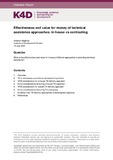| dc.contributor.author | Megersa, Kelbesa | |
| dc.date.accessioned | 2022-10-07T11:29:45Z | |
| dc.date.available | 2022-10-07T11:29:45Z | |
| dc.date.issued | 2022-07-15 | |
| dc.identifier.citation | Megersa, K. (2022). Effectiveness and value for money of technical assistance approaches: in-house vs contracting. HDR 1176. Brighton, UK: Institute of Development Studies. DOI: 10.19088/K4D.2022.135 | en |
| dc.identifier.uri | https://opendocs.ids.ac.uk/opendocs/handle/20.500.12413/17694 | |
| dc.description.abstract | In the development field, technical assistance (TA) broadly refers to support for a specific project or country programme in the form of technical advice, research and data sharing, and skills training, among other activities. As a result, TA may be more valuable as a development tool than the amount of funding received.
The primary areas of focus for TA include developing a project pipeline, de-risking investments, and assisting TA beneficiaries in their efforts to improve business standards, as well as supporting policy reforms by developing country.
Because TA recipients may face a variety of issues, effective TA programmes can take many forms. TA programmes must be established to address beneficiaries’ primary concerns. The goal for both TA recipients and donors should be to determine the main objective of the TA and to select from a variety of technical adviser, taking into account the limitations and enabling conditions for each approach (Nastase et al., 2020).
Some useful principles (or good practices) when designing and implementing TA (through in-house or external contracting) include:
• Importance of local ownership:
• Partnerships and inclusivity:
• Effectiveness:
• Value-for-money (VFM):
TA can be delivered in-house or by contracting out TA to other firms or suppliers. However, each approach has certain merits (VFM and other factors) and shortcomings.
There is a very limited evidence base regarding an explicit discussion of the merits of in-house vs commissioned TA programming. Much of the available evidence simply describes TA programme elements – rather than the VFM behind business cases for in-house or contracted TA design and delivery. | en |
| dc.description.sponsorship | Foreign, Commonwealth and Development Office (FCDO) | en |
| dc.language.iso | en | en |
| dc.publisher | Institute of Development Studies | en |
| dc.relation.ispartofseries | K4D Helpdesk Report;1176 | |
| dc.rights.uri | https://www.nationalarchives.gov.uk/doc/open-government-licence/version/3/ | en |
| dc.subject | Development Policy | en |
| dc.title | Effectiveness and Value for Money of Technical Assistance Approaches: In-house vs Contracting | en |
| dc.type | Helpdesk | en |
| dc.rights.holder | © Crown copyright 2022 | en |
| dc.identifier.doi | 10.19088/K4D.2022.135 | |
| dcterms.dateAccepted | 2022-07-15 | |
| rioxxterms.funder | Default funder | en |
| rioxxterms.identifier.project | K4D | en |
| rioxxterms.version | VoR | en |
| rioxxterms.versionofrecord | 10.19088/K4D.2022.135 | en |
| rioxxterms.funder.project | 0986883a-6d0f-4bb8-9c46-5e0682934d65 | en |

